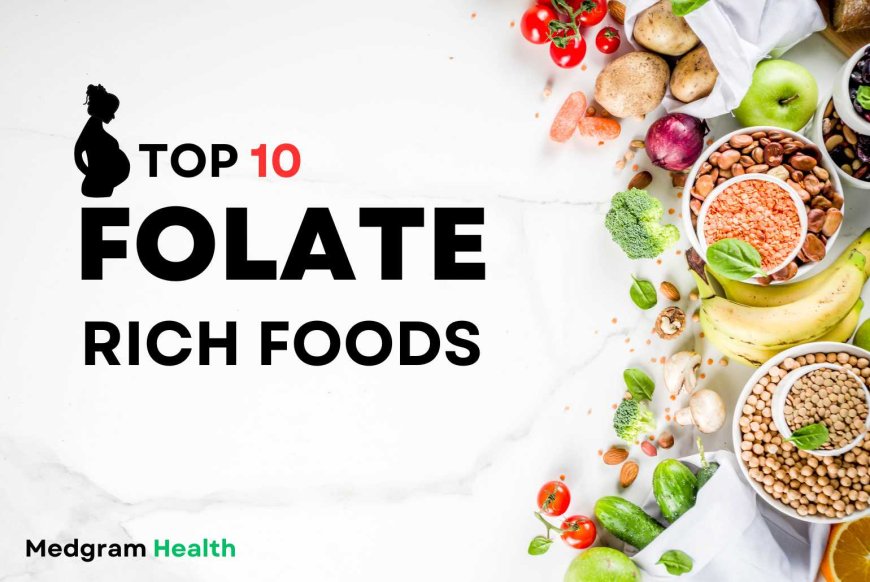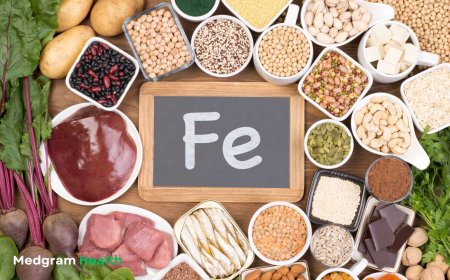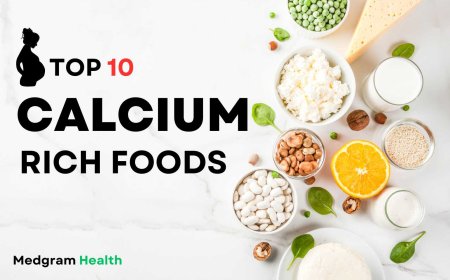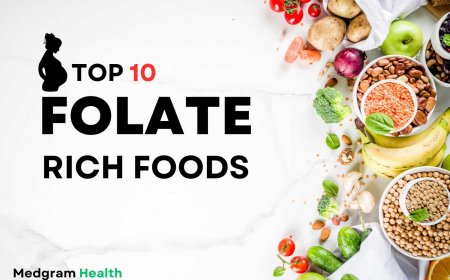Top 10 Folate-Rich Foods for a Healthy Pregnancy
Discover the top 10 folate-rich foods essential for a healthy pregnancy. Learn how these foods support fetal development and prevent birth defects.

During pregnancy, maintaining optimal folate levels is essential for both the mother and the developing baby. Folate, a B-vitamin (B9), plays a crucial role in cell growth, DNA synthesis, and neural tube development.
A folate deficiency during pregnancy can increase the risk of neural tube defects and other developmental issues, so it's highly recommended that pregnant women consume folate-rich foods along with folic acid supplements. Let’s dive into the top folate-rich foods to include in your diet during pregnancy!
1. Leafy Green Vegetables
- Examples: Spinach, kale, romaine lettuce, collard greens.
- Folate Content: 100-200 micrograms per 1-cup serving, depending on the type.
- Benefits: Leafy greens are nutritional powerhouses packed with vitamins A, C, and K, iron, and fiber. Their high folate content makes them an ideal addition to your pregnancy diet.
- How to Eat: Add to salads, smoothies, or lightly steam for maximum nutrient retention.
2. Citrus Fruits
- Examples: Oranges, lemons, grapefruits, and limes.
- Folate Content: Around 40-50 micrograms per medium orange.
- Benefits: Citrus fruits provide a good dose of folate and vitamin C, which boosts immunity and enhances iron absorption.
- How to Eat: Enjoy them fresh, in juices, or as a zest in various dishes.
3. Beans and Legumes
- Examples: Black beans, lentils, chickpeas, and kidney beans.
- Folate Content: 90-180 micrograms per half-cup cooked serving.
- Benefits: Beans are high in protein, fiber, and iron, which are essential for pregnancy. Lentils, in particular, are very high in folate, with just half a cup providing over 180 micrograms.
- How to Eat: Add to soups, salads, and curries or blend into dips like hummus.
4. Avocado
- Folate Content: Approximately 80 micrograms per half avocado.
- Benefits: Avocado is rich in healthy monounsaturated fats, fiber, and vitamins like K and E, which are essential for fetal growth.
- How to Eat: Spread on toast, add to salads, or blend into smoothies for a creamy texture.
5. Asparagus
- Folate Content: 89 micrograms per half-cup cooked.
- Benefits: Asparagus is low in calories but loaded with vitamins A, C, and K, and fiber, which aids digestion.
- How to Eat: Steam or grill and add to side dishes or salads.
6. Broccoli
- Folate Content: About 57 micrograms per cup, cooked.
- Benefits: In addition to folate, broccoli contains calcium, fiber, and antioxidants, which are beneficial for both mother and baby.
- How to Eat: Add to stir-fries, steam as a side dish, or include in casseroles.
7. Nuts and Seeds
- Examples: Sunflower seeds, almonds, peanuts.
- Folate Content: About 66 micrograms per 1-ounce serving of sunflower seeds.
- Benefits: Nuts and seeds are rich in healthy fats, protein, and fiber, and provide a plant-based source of folate.
- How to Eat: Enjoy as a snack, add to oatmeal, or sprinkle over salads and yogurt.
8. Brussels Sprouts
- Folate Content: Approximately 78 micrograms per half-cup cooked.
- Benefits: Brussels sprouts are a good source of vitamins C, K, and fiber. Their folate content helps support neural development.
- How to Eat: Roast or sauté and serve as a side dish, or add to stir-fries for extra flavor and nutrition.
9. Beets
- Folate Content: Around 148 micrograms per cup, cooked.
- Benefits: Beets are rich in antioxidants and also provide potassium, iron, and fiber, which support blood flow and oxygen delivery.
- How to Eat: Add to salads, soups, or roast and serve as a side dish.
10. Eggs
- Folate Content: About 22 micrograms per large egg.
- Benefits: Eggs are a complete protein source with essential nutrients like choline, which supports brain development in the baby.
- How to Eat: Include in your breakfast, add to salads, or have as a snack. Boiling or poaching eggs preserves more nutrients.
Why is Folate Crucial During Pregnancy?
Folate plays an essential role in:
- Preventing Neural Tube Defects: Adequate folate intake can help prevent birth defects of the brain and spine, such as spina bifida.
- Supporting DNA Synthesis: Folate is vital for DNA production and repair, which supports rapid cell division during fetal development.
- Reducing the Risk of Preterm Birth: Studies suggest that higher folate levels may lower the risk of preterm delivery.
Tips for Meeting Your Folate Needs
- Supplementation: While dietary folate is crucial, most healthcare providers recommend taking folic acid supplements during pregnancy for additional support.
- Balanced Diet: Include a variety of these folate-rich foods to ensure you’re meeting your daily needs, as folate is best absorbed from a combination of food and supplements.
- Cooking Methods: Light steaming or consuming certain vegetables raw preserves folate levels, as it can be lost during prolonged cooking.
Recommended Folate Intake in Pregnancy
According to the CDC and WHO, pregnant women should aim for a daily intake of 400-600 micrograms of folate (ref). Consult with your healthcare provider to determine the right balance between dietary folate and supplementation.
What's Your Reaction?













